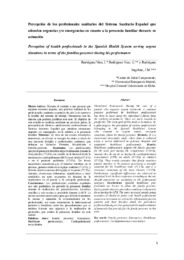Título :
Percepción de los profesionales sanitarios del Sistema Sanitario Español que atienden urgencias y/o emergencias en cuanto a la presencia familiar durante su actuación |
Autor :
Rodríguez Vico, Isabel
Rodríguez Vico, Carlos
Rodríguez Ingelmo, José María |
Departamento:
Departamentos de la UMH::Psicología de la Salud |
Fecha de publicación:
2019-01-31 |
URI :
https://hdl.handle.net/11000/28435 |
Resumen :
Durante el cuidado a una persona que requiere atención urgente, una práctica habitual de los profesionales sanitarios españoles ha sido la de apartar a la familia del entorno de trabajo. Numerosas son las razones que podrían justificar este acto. El objetivo de este estudio es analizar, mediante un proyecto piloto, la percepción de diversos profesionales pertenecientes al Sistema Sanitario Español que atienden situaciones urgentes y/o emergentes, en lo relativo a la presencia familiar.Métodos:Se trata deun estudio descriptivo transversal, en el cual se recogen los datos a través de una encuesta dirigida a profesionales sanitarios que trabajan en Atención Primaria, Hospitalaria y Extrahospitalaria.Resultados:Los profesionales apoyan la presencia familiar mayoritariamente durante la venopunción (75.6%), en cambio no lo hacen durante la reanimación cardiopulmonar (RCP) en el adulto (57.8%) o en el paciente pediátrico (57.8%). De forma mayoritaria consideran que el familiar interfiere en el proceso, generan estrés en el equipo sanitario (71.1%), y debería existir consenso del equipo al respecto (73.3%). Además, observamos diferencias significativas a nivel estadístico en estas respuestas en función de la experiencia en el puesto y la categoría profesional.Conclusiones:Los profesionales sanitarios españoles son más partidarios de permitir la presencia familiar durante la realización de procedimientos invasivos sencillos y más reacios a permitirla durante la RCP. La misma muestra encuestada opina que debería fomentarse la misma y aumentar la concienciación de los profesionales, así como incrementar la informacional paciente y familiares sobre los procedimientos que se realizan durante una urgencia y la realización de protocolos que avalen la presencia familiar en este ámbito
Theoretical Framework:During the care of a patient who requires urgent treatment, a common practice performed by healthcare professionals has been to move away the individual’s family from the working environment. There are many reasons to justify this. The main goal of this study is to analyze, by a pilot project, the perception of various professionals belonging to the Spanish Healthcare System who respond to urgent and/or emergentsituations, about the family presence. Methods:It is a transversal descriptive study where data is collected using a survey addressed to primary, hospital and outpatient healthcare professionals. Results:Healthcare professionals support the family presence for the most part during the venipuncture (75.6%); instead, they do not do so during the cardiopulmonary resuscitation (CPR) on adults (57.8%) or children (57.8%). They mostly consider that family members usually interfere in the process generating a stressful situation for the healthcare team (71.1%), and it is necessary consensus of the team thereon (73.3%). Furthermore, significant differences are observed at statistical level in these responses according to the on-the-job experience or according to the professional category. Conclusions:Spanish healthcare pro-fessionals are keener to allow thefamily presence during simple invasive procedures and more reluctant to do so during the CPR. The same surveyed sample group considers it should be foster and health professional awareness increased, as well as the information given to patients and their families about the procedures performed during an emergency and the implementation of protocols thatprovide for the family presence in this area
|
Palabras clave/Materias:
Family presence
Emergency
Healthcare professionals
Cardiopulmonary resuscitation |
Área de conocimiento :
. Psicología |
Tipo de documento :
info:eu-repo/semantics/article |
Derechos de acceso:
info:eu-repo/semantics/openAccess |
Publicado en:
Revista Psicología de la Salud, V.7, nº1 (2019) |
Aparece en las colecciones:
Vol. 7 Núm. 1 (2019)
|
 La licencia se describe como: Atribución-NonComercial-NoDerivada 4.0 Internacional.
La licencia se describe como: Atribución-NonComercial-NoDerivada 4.0 Internacional.
.png)
